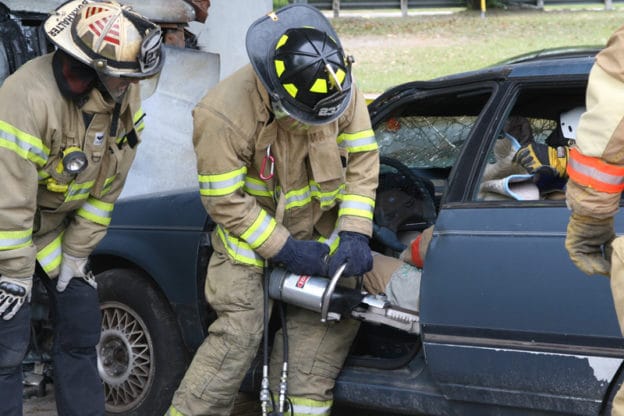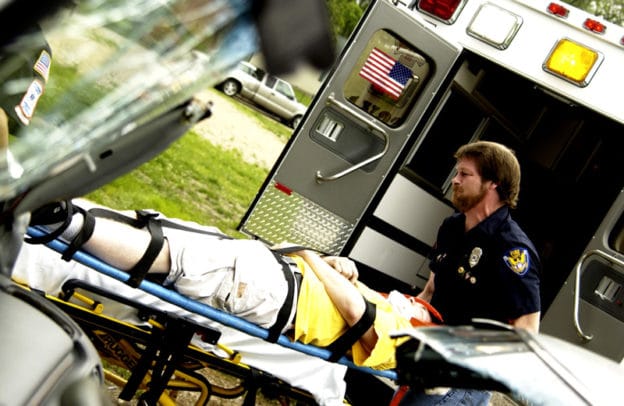Addiction Treatment for 911 First Responders
In recent years, the rates of substance use disorders amongst 911 first responders, firefighters, and police have increased. In fact, the pandemic and other events of 2020 led to an increase in substance use disorders among emergency responders and all other Americans in every state. Addiction risks affect all different types of first responders.
Recovery Is Possible
Take Back Your Life Today
Hear From Past Client's
“I came here a broken man and was greeted with open arms. If you are struggling with addiction the folks down at Grace Land got you covered. Y'all will always hold a special place in my heart.”
- Jon A.
“Great staff!!! They definitely go above and beyond here! Thanks for helping me save my life!! Y’all are awesome!”
- Amber N.
“Grace Land Recovery goes above and beyond in providing therapeutic methods to attain and maintain sobriety. The staff is personally invested in helping their clients turn their lives around.”
- Jack R.
“What an amazing program and caring staff Grace Land Recovery has! I highly recommend this program to those seeking help in Memphis. Phil is the man!”
- Troy R.
“Amazing staff. Thank you for everything.”
- Ashley M.
Types of 911 First Responders
It’s important to understand the unique hardships first responders go through. It’s also important to understand why 911 first responders need addiction treatment that fits their specific needs.
Firefighters
 According to the National Survey on Drug Use and Health, nearly 30% of firefighters abuse alcohol.[1] About 10% misuse prescription painkillers. Firefighters are often injured on the job due to falls, smoke inhalation, or other risks. Their duties can leave them with temporary or long-term pain from injuries, which they often use prescription opioids to treat.
According to the National Survey on Drug Use and Health, nearly 30% of firefighters abuse alcohol.[1] About 10% misuse prescription painkillers. Firefighters are often injured on the job due to falls, smoke inhalation, or other risks. Their duties can leave them with temporary or long-term pain from injuries, which they often use prescription opioids to treat.
Since dependency risks are high with opioids, addiction risks are also high. When firefighters become addicted to opioids and develop a tolerance to these types of drugs, they face a greater risk of suffering a dangerous or fatal overdose. Some firefighters even turn to alcohol or other drugs to cope with stress, trauma, or pain.
Emergency Medical Technicians (EMTs) and Emergency Medical Services (EMSs)
 Emergency medical technicians never know what may await them when they receive a call. For example, there may be a day when they may have to rush to a home and administer a life-saving shot to someone who is having an anaphylactic reaction.
Emergency medical technicians never know what may await them when they receive a call. For example, there may be a day when they may have to rush to a home and administer a life-saving shot to someone who is having an anaphylactic reaction.
Saving a life can give EMTs encouragement, but they also see firsthand suffering, death and pain regularly. Some calls they receive lead them to crime or accident sites that cause them to later experience mental trauma. Witnessing these sights, trying to help anguished families, and continually being under immense pressure are parts of daily life for EMTs.
When stress takes a toll on EMTs, they may turn to drugs or alcohol. Because 911 first responders often have easy access to opioids and even illegal drugs when they respond to scenes where there are drugs, abusing drugs is unfortunately often all too easy for them.
According to SAMHSA, almost 70% of EMTs and other EMS workers do not have time to fully recover from traumatic events before they face another one.[2] To make matters worse, EMT and EMS professionals tend to not get enough sleep.
As a result, depression, suicidal thoughts, PTSD, alcohol abuse, and opioid painkiller abuse are common among EMTs.[2] Other EMS workers, such as dispatchers, often even develop addictions after traumatic calls that end in tragedies.
Police and Law Enforcement
 Police and law enforcement face a risk that is not as common among EMTs or firefighters. That risk is being attacked. With the growing number of such attacks on law enforcement officials, many face a greater fear of even conducting everyday, routine activities in their uniform.
Police and law enforcement face a risk that is not as common among EMTs or firefighters. That risk is being attacked. With the growing number of such attacks on law enforcement officials, many face a greater fear of even conducting everyday, routine activities in their uniform.
Additionally, law enforcement officials must often make heartbreaking decisions to uphold laws, even when they may upset families. Police officers also must witness traumatic accident sites and other emergency situations.
The continual stress that law enforcement responders face can cause them to develop mental health disorders and substance use issues. For example, after Hurricane Katrina, officers involved in the aftermath reported drinking up to seven drinks per day to cope with the trauma.[2]
SAMHSA reports that anxiety and depression rates are much higher among law enforcement than they are with the general public. Additionally, nearly 25% of law enforcement responders reported suicidal ideation.[2]
In addition to drinking alcohol excessively to cope with the stresses of their jobs, law enforcement often misuse opioids or other drugs. Since police often seize drugs, the availability of substances and unique stresses only make their risks of misuse higher.
Why Addiction Treatment for 911 First Responders Is Essential
The risk factors for developing addictions and mental health disorders cannot be removed from the equation for first responders. First responders live with daily stress and regularly witness trauma. Thus, it becomes normal for their brains to cause them to seek substances.
When people witness severe trauma, especially repeatedly, stress responses in the body tend to make them seek ways to cope.[3] Opioids and other drugs, as well as alcohol, can provide temporary feelings of tranquility or euphoria.
Some people may take drugs or alcohol simply to help them sleep. However, nightmares are still common among 911 first responders.
Living in a continual cycle with poor or inadequate sleep and facing daily trauma leaves first responders with high substance use disorder and mental health disorder risks. First responders are more likely to suffer from co-occurring disorders with substance use disorders and mental health disorders such as anxiety, PTSD, or depression.[3] PTSD in first responders is especially common.
Addiction Treatment for First Responders
Because of the unique risks and traumas first responders face, they need specialized treatment that meets all their needs. According to the National Fire Volunteer Council, more than 75% of the firefighters surveyed said they would be more willing to enter a treatment program if it was designed specifically for their unique needs.[4]
There are several forms of treatment programs for first responders. Addiction treatment professionals evaluate the unique needs of each of their first responder patients to determine the right combination of addiction therapies for them and how frequently they will need to take them.
Dual Diagnosis Treatment for 911 First Responders
Individuals that suffer from co-occurring disorders contain dual diagnoses. As noted before, it is common to see depression, anxiety, and PTSD in first responders who struggle with addiction. Because of this, the need for dual diagnosis treatment is essential.
Dual diagnosis treatment helps treat substance use disorders and their co-occurring mental health disorders simultaneously. Mental health professionals still recommend that individuals with dual diagnosis disorders receive ongoing treatment to manage their mental health issues though after they complete dual diagnosis treatment.
A comprehensive and thorough approach to dual diagnosis treatment is necessary. This is because leaving one condition within a dual diagnosis untreated makes relapse risks higher.[5]
If a first responder turns to a substance after developing PTSD or depression, removing the substance leaves the co-occurring disorder untreated. By finding and treating the root causes of addiction and co-occurring disorders, professionals help first responders learn how to cope with life and beat addiction.
Program Structures for Addiction Treatment for 911 First Responders
Every first responder has different experiences and perceptions. Also, the home lives of first responders vary widely. For example, one person may live with family in a supportive home. Another person may live alone or with roommates who drink or misuse drugs.
The home environment, mental health, and experiences of a first responder are important factors that influence whether or not that first responder develops an addiction. A first responder’s home life also impacts the level of care, or program structure, he or she will need in rehab. Below are some common addiction treatment program structures.
Partial Hospitalization Program (PHP) Treatment
This is one of the most intensive addiction treatment programs. It is ideal for first responders who don’t have a support network at home or have a high risk of relapse but still suffer from a severe enough addiction to need intense addiction treatment that lasts several hours a day, several days a week.
Partial hospitalization program (PHP) treatment is also helpful for first responders with high-risk co-occurring mental health conditions. PHP treatment usually lasts about five to eight hours per session and occurs for five to seven days each week.
Intensive Outpatient Program (IOP) Treatment
An intensive outpatient program (IOP) usually involves shorter sessions than a PHP. IOP sessions are also usually less frequent than PHP sessions. Relapse risks, living situations, and other factors determine the ideal rehab session length and frequency for a 911 first responder.
Outpatient Treatment
Regular outpatient treatment for addiction usually lasts around a couple of a day, one or two days a week. 99 first responders with mild substance addictions who live in supportive environments are best suited for this structure of rehab.
Case Management and Relapse Prevention
All 911 first responders that suffer from addiction can benefit from case management services and relapse prevention. Relapse prevention is especially important for all first responders as it addresses the levels of emotional, mental, and physical relapse that first responders with substance addictions can succumb to.
Finding Addiction Treatment for 911 First Responders in Tennessee
We here at Grace Land Recovery are dedicated to helping 911 first responders live fuller lives that are free from substance addictions. We’re also dedicated to helping our patients learn how to cope with trauma and any mental illness that is co-occurring with a person’s addiction.
If you or a loved one is a first responder who needs help overcoming substance addiction, our special treatment programs are designed to meet unique needs. If not, please contact us to find the dedicated and compassionate support you deserve.
We encourage people of all faiths to offer a prayer for first responders everywhere. Thank you first responders for all you do!
References:
- [1] https://www.samhsa.gov/data/sites/default/files/reports/rpt29392/Assistant-Secretary-nsduh2019_presentation/Assistant-Secretary-nsduh2019_presentation.pdf
- [2] https://www.samhsa.gov/sites/default/files/dtac/supplementalresearchbulletin-firstresponders-may2018.pdf
- [3] https://www.ncbi.nlm.nih.gov/books/NBK207191/
- [4] https://crsreports.congress.gov/product/pdf/R/R46555
- [5] https://medlineplus.gov/dualdiagnosis.html
Recovery Is Possible
Take Back Your Life Today
Hear From Past Client's
“I came here a broken man and was greeted with open arms. If you are struggling with addiction the folks down at Grace Land got you covered. Y'all will always hold a special place in my heart.”
- Jon A.
“Great staff!!! They definitely go above and beyond here! Thanks for helping me save my life!! Y’all are awesome!”
- Amber N.
“Grace Land Recovery goes above and beyond in providing therapeutic methods to attain and maintain sobriety. The staff is personally invested in helping their clients turn their lives around.”
- Jack R.
“What an amazing program and caring staff Grace Land Recovery has! I highly recommend this program to those seeking help in Memphis. Phil is the man!”
- Troy R.
“Amazing staff. Thank you for everything.”
- Ashley M.
Common Addiction Therapies
These are some common addiction therapies:
- Trauma therapy – It identifies trauma sources, addresses them, and includes ongoing treatment during and after an initial program.
- Anger management therapy – A form of therapy that helps people that can’t control their anger and get angry often manage their anger triggers.
- Cognitive-behavioral therapy– This is a form of addiction therapy that helps teach people how to change their negative thoughts, emotions, and behaviors into positive ones.
- Rational emotive behavior therapy– This form of therapy can help people battle negative thoughts by bringing awareness to them and challenging them.
- Experiential therapy – It exposes patients to non-traditional addiction therapy that are filled with activities that can help people discover important aspects of themselves.
- Group therapy – Therapy that occurs amongst one therapist and a group of individuals suffering from addiction.
- Family therapy – Therapy that occurs with one therapist and close relatives of a person that is suffering from addiction. The person suffering from addiction should also attend this type of therapy session.
- Individual therapy – involves the first responder and a counselor to address the unique effects the individual experiences.
There are many other supportive addiction therapies. Even prayer for first responders can provide those who belong to a certain faith with the strength and willpower to get better.
Find Your Recovery


